‘Green’ energy projects threaten to wipe off ancient ‘orans’ in Jaisalmer, Rajasthan
Almost every village and temple in Jaisalmer has an ‘oran’ or a sacred grove believed by many to be the abode of gods. They are also home to many endangered species of trees, birds and other creatures. However, plans are afoot to use the land to set up renewable energy projects, which locals fear might wipe these groves out.

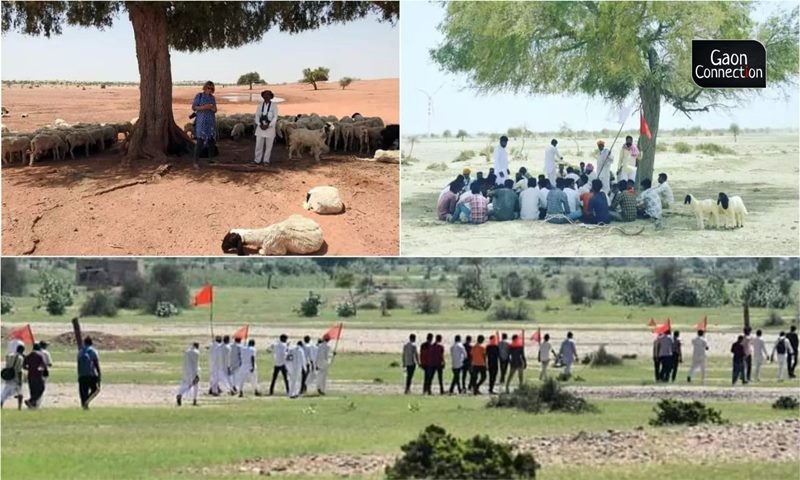
The cost of ‘progress’ is being felt keenly by the creatures that inhabit the Orans.
Jaisalmer, Rajasthan
Maybe it is because they are from a desert state, their love for water and trees runs so deep. Many of Rajasthani traditions are linked inextricably to the environment.
Such as the oran, a term derived from the Sanskrit aranya meaning forest. Orans are sacred groves and pasture lands, usually abutting temples, where no cultivation takes place and flora and fauna are allowed to grow and roam free. Trees are never cut here and the area belongs to no one.
“Jaisalmer has nearly hundred orans and most of them are seven to eight hundred years old,” Bhopal Singh, environmental activist from Jhalora village, Jaisalmer, told Gaon Connection. “And many of them are associated with history and lore that every inhabitant here is acquainted with,” the 30-year-old said.
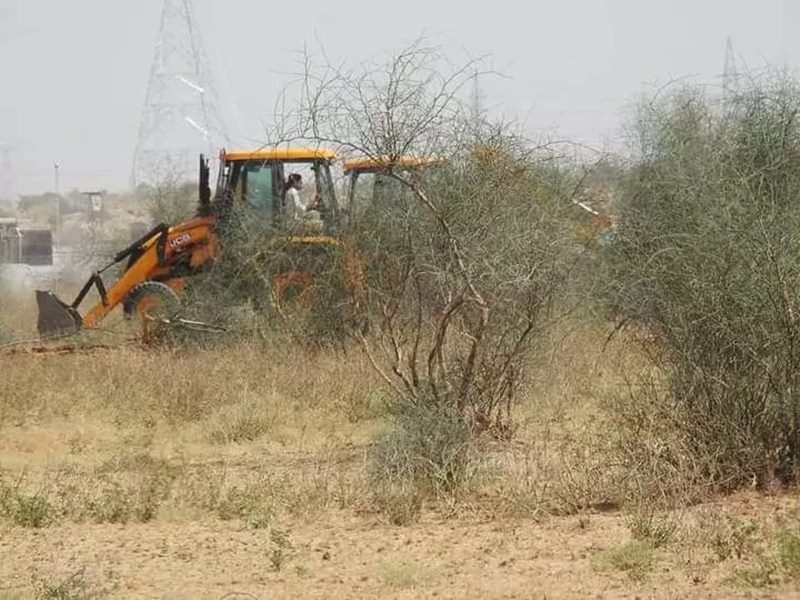
The orans in Jaisalmer are repositories of history, lore and faith of the people. In them are found endangered and rare species of birds. These orans were free from any administrative interventions, until recently.
Also Read: The desert coolers of Rajasthan
Many nature lovers and environmentalists of Rajasthan are concerned at how several orans are being cleared of their trees, shrubs and pasture land to make way for ‘green’ power plants and windmills. The cost of ‘progress’ is being felt keenly by the creatures that inhabit the Orans.
‘Green’ assault on orans
On July 26, at the oran near the 610-year-old Degrai Mata temple in Devikot, Jaisalmer district, a chinkara came into contact with a live wire and died. Earlier in the month, on July 3, a camel died in the same way.
Local inhabitants complain that in the name of progress, private companies are taking over the ‘commons’ to put up solar plants.
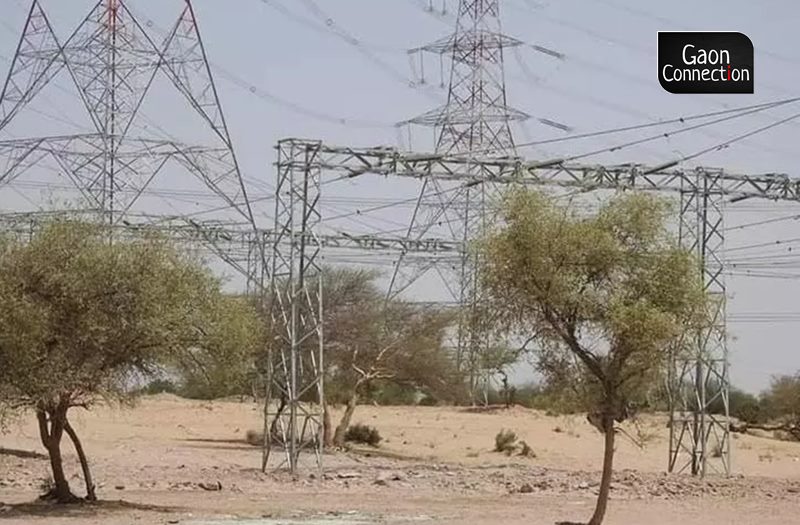
“The administration is turning a blind eye to the environmental damage and putting up overhead electric lines in villages such as Bhimsar, Bhopa, Savata and Rasala,” Sumer Singh Sawnt, a camel breeder and an environmental activist, told Gaon Connection. “The forest department has abandoned all efforts to save birds. The high tension electric cables everywhere have already killed so many birds,” the 50-year old Sawant pointed out.
Not too long ago a Great Indian Bustard was killed as it got entangled in the overhead wires. The Great Indian Bustard is a critically endangered bird that figures in the International Union for Conservation of Nature Red List of Threatened Species, and in the National WildlifeAction Plan (2002-2016).
“We have presented a memorandum to the [Jaisalmer] district collector so that work on setting up power and solar power plants here can be stopped,” Sawant said.

Also Read: Rajasthan: Camels and sheep to face a fodder crisis as about 600-year-old Oran is being uprooted
About 80 kms northwest of Degrai Oran, lies the 800-year-old oran of Dungar Ji Pir, in Mokla village. It is about 15,000 acres (approximately 6,000 hectares) large, and is about 40 kms in circumference.
Today, there are nearly 80 windmills standing within the Dungar Ji Pir oran, where highway work is underway too. Contractors are digging up the oran for mud. The local people fear that in a few years, nothing will be left of the oran.
Orans have no form of legal protection
The lack of documentation or registration of the orans, is proving to be a big hurdle for those raising their voice against building activity in and around them. Only a handful of orans in Rajasthan are legally registered, and therefore they cannot be legally protected.
In almost every village in Jaisalmer district, there are such orans, big and small, that are not registered legally. However, people are raising slogans, taking out marches and giving representations to government officials to prevent the destruction of the orans.
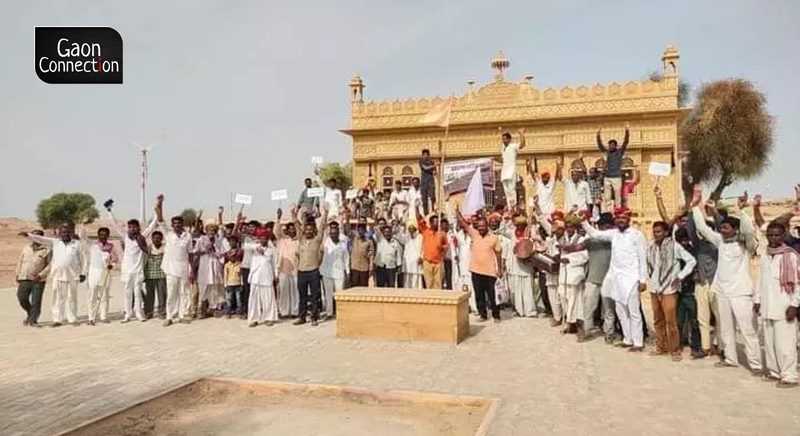
Also Read: Treeman: Bhaiyaram Yadav of Chitrakoot has created a forest with more than 40,000 trees
Already this year, several protest processions have been taken out in Jaisalmer. A two-day yatra was staged on June 23 and 24, in order to expedite the registration of the Dungar Ji Pir oran. People from Mokla and neighbouring villages took part.
Local outrage at the taking over of an oran at Salkha village in Jaisalmer has been gathering strength ever since the administration and private companies have launched ‘green energy’ projects there.
The Veervar Aala Ji Jhunjhar oran in Salkha village is spread over almost 20,000 bighas (5,058 hectares). The oran is in memory of all those heroes who sacrificed their lives between the 16th and 18th centuries to protect Jaisalmer’s freedom. And according to the local inhabitants, private companies are looking to occupy these lands.
On July 11 a procession set out from Aala temple in Salkha, that reached the Jaisalmer district collectorate, 45 kms away the following day, July 12, in the afternoon. The people submitted a petition to protect the oran to the district collector there.
A haven for Nature and repository of heritage
“It is a crime to enter an oran with an axe,” Chatar Singh Jaam from Ramgarh village, Jaisalmer, told Gaon Connection. “The oran conserves and protects local vegetation. Even to think of hunting here is a crime. We believe that gods inhabit these forests and lands,” the 65-year-old added.

According to Jaam the oran is where many creatures seek protection and sustenance. Cattle graze on the oran pasturelands. The water sources in it are not just sacred, but in times of such environmental changes in the world, they are vital, Jaam continued. He said he was happy so many young people felt so keenly about the orans but was visibly upset about the stance the government was taking.
“The orans are a sanctuary not just for local birds, but also for migratory birds. The forest department of the government spends millions of rupees on conservation. Yet, authorities do not realise the important role the orans play in safeguarding the environment and the ecology,” Jaam said.
Also Read: A walk through the vanams or mini urban forests of Coimbatore in Western Tamil Nadu
The orans have been around for nearly 800 years or more and have been a sanctuary for many birds and animals. The Indian desert cat is found here as are flamingoes.
In fact, earlier this year, in April, the rare melanistic egret was sighted for the first time in the country at the Degrai oran.
“It is a shame that such a magnificent environment is being destroyed in the name of progress,” Ilse, a German researcher on camels, who has been visiting Jaisalmer for over 30 years, told Gaon Connection.
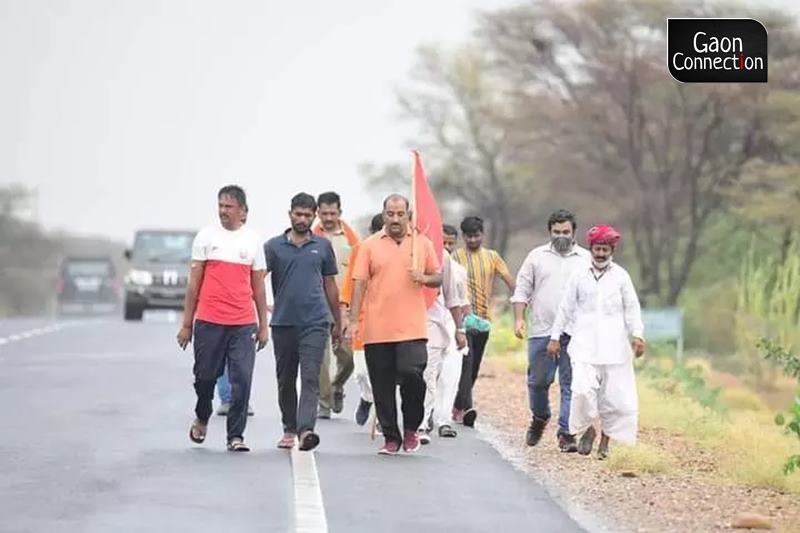
She added that the orans were safe spaces for camels to graze and rest in. If they are destroyed, not just the animals but even the people living around the orans will be adversely impacted, she said.
“We will sacrifice our lives to protect the oran,” Sangh Singh Bhati, a former Bharatiya Janata Party legislator, told Gaon Connection. He was referring to the Tanot oran attached to the Tanot Rai Mata temple in Asakandra village in Pokaran, Jaisalmer, about 20 kms from the Indo-Pakistan border.
“The Tanot Rai oran carries the heritage of our ancestors. It also protects Nature. The government is committing a grave mistake by handing over the sacred orans to private companies,” Sawant said. “If this oran is handed over to any private company, we will sacrifice our lives,” he said, charged with emotion.
Read the story in Hindi.

